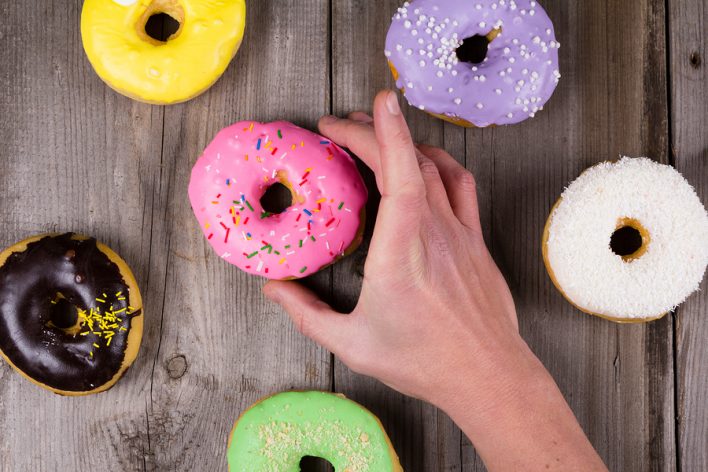Advice
Letting go of controlling behaviours
By: Lorraine Hackett
Updated: 23 January 2019

Dieting, the consumption or overconsumption of food and restructured understanding of what food represents can enable some anxiety sufferers to engage in some really controlling behaviour.
If you are worried about what control means to you, start a new journey by asking yourself the following questions:
How much resonance does my voice have within the decisions that I make in my life?
Often, if we feel that we are making decisions in our lives from a place of minimal choice, we can feel overwhelmed by the search for validation from an external source.
For example, if a friend or partner wants a different path in life than we do, we can become consumed not just with the idea of ‘changing their mind’ but with the underlying issue: that our own opinion and idea of what we want is not being heard and therefore doesn’t matter.
If we find that we make choices for ourselves based not on our own needs and desires but on those of others around us, it can leave us feeling out of control and chaotic.
How important is it to me to be in control?
Different people will have a different idea of what control represents.
Gender can play a large part in this. Our idea of our own masculinity, femininity or place on a gender fluidity spectrum can cause us to take on control and decision making traits that we feel are classically or societally appropriate to the gender that we identify with.
Negating our own voice within our decision-making process is another element in our relationship with control. Feelings of satisfaction or self-worth can arise for some people when they feel that they are passive participants in their own lives. In fact, this can often be a source of safety and security for some people. If this is the case for you, ask yourself why this is the way it is? Also, are there any negative ramifications to this manner of being in the world?
For many people raised in a particularly controlling environment, they can spend a lifetime engaged with issues around their control over their own lives. When we are controlled by another, even as a child, we spend time either relishing or distancing ourselves from the process of decision making within our own lives.
In what areas of my life do I feel most in control?
- For some, a confident inner voice is all of the control that they need. For others, the external will always hold a mystical quality and seem to be something that they cannot ever influence in the way that they want to.
- For those who always feel ‘in control’, chaotic external events (a death, for example, or a societal or economic shift) can cause significant feelings of overwhelming fear.
- For those who feel that they do not control their own lives, every decision can seem to hold resonance and they can feel perpetually stressed at their incapacity to hold influence over themselves or others.
What are the areas within my life that allow me the most access to control?
- Sex, food, inebriates, my body
- The common factors amongst the most common spaces for control issues to manifest are that they are based within the physical space.
- Control, however, is an emotional issue.
- However we issue control over ourselves, it will likely manifest as a physical representation of the internal struggle that we encounter in relation to the issue.
- Monitor your physical compulsions. How healthy is my relationship with sex for example? What element of control do I require within this relationship? How confident am I with my own pleasure? These questions allow you to understand how internal emotional struggles can sometimes manifest within our personal physical space.
Written by MyMind psychotherapist Lorraine Hackett
MENTAL HEALTH PROFESSIONALS WORKING WITH Anxiety ISSUES:
Approach: Cognitive Behavioural Therapy (CBT) , Humanistic & Integrative Psychotherapy , Person-Centred Therapy , Psychodynamic Therapy , Other
Works with: Individual Session
Specialities: Addiction , Anger , Anxiety , Bereavement / Loss , Depression , Domestic Violence / Abuse , Eating Disorder / Body Image , Relationship issues , Self-Esteem , Sexuality (LGBTQIA+) , Stress , Suicidal Ideation / Self Harm , Other
Next avaialble appointment: 11:00 24 February 2025
Approach: Cognitive Behavioural Therapy (CBT) , Humanistic & Integrative Psychotherapy , Mindfulness , Person-Centred Therapy
Works with: Individual Session
Specialities: Addiction , Anger , Anxiety , Bereavement / Loss , Bullying , Depression , Isolation / Loneliness , Personal Development , Relationship issues , Self Care , Self-Esteem , Stress , Suicidal Ideation / Self Harm , Trauma , Work Issues, Work/Life balance
Next avaialble appointment: 13:00 24 February 2025
Approach: Cognitive Behavioural Therapy (CBT) , Mindfulness , Person-Centred Therapy , Psychodynamic Therapy , Solution-Focused Brief Therapy
Works with: Individual Session
Specialities: Anger , Anxiety , Bereavement / Loss , Depression , Isolation / Loneliness , Personal Development , Relationship issues , Stress , Suicidal Ideation / Self Harm , Work Issues, Work/Life balance
Next avaialble appointment: 8:00 25 February 2025
NEXT ARTICLE
Healing a toxic relationship with food
Search
Get The Support You Need
From One Of Our Counselors
News
Isolation
Anxiety
Depression
Relationship Issues
Counselling
Personality Disorder
Addiction
Trauma
Children and Adolescent
Anger
Bereavement
Chronic Illness
Communication Issues
Eating Disorder
Post natal depression
Stress
LGBTQI+
Panic Attack
OCD
Resilience
Parental support
Men's Mental Health
Category List
All Posts
News
Isolation
Anxiety
Depression
Relationship Issues
Counselling
Personality Disorder
Addiction
Trauma
Children and Adolescent
Anger
Bereavement
Chronic Illness
Communication Issues
Eating Disorder
Post natal depression
Stress
LGBTQI+
Panic Attack
OCD
Resilience
Parental support
Men's Mental Health

